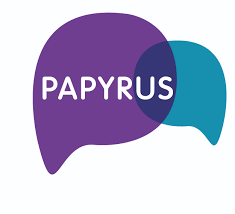
To contact Papyrus' Hopelink:
Call: 0800 068 41 41HOPELINEUK is a specialist telephone service staffed by trained professionals who give non-judgemental support, practical advice and information to children, teenagers and young people up to the age of 35 who are worried about how they are feeling - and anyone who is concerned about a young person.
Opening hours (UK)We exist to reduce the number of young people who take their own lives by shattering the stigma around suicide and equipping young people and their communities with the skills to recognise and respond to suicidal behaviour.
Beliefs that guide our thinking:
PAPYRUS believes that many young suicides are preventable
PAPYRUS believes that no young person should suffer alone with thoughts or feelings of hopelessness
PAPYRUS believes that no one should have to go through the heartbreak of losing a loved one to suicide
PAPYRUS believes that everyone can play a role in preventing young suicide.
Am I going crazy?
Lots of young people worry that because they are thinking about suicide, this must mean they are crazy. We want to reassure you that you are not crazy. People think about suicide for a lot of different reasons and usually it’s because they feel it’s the only escape from a situation that seems impossible or a feeling that they can’t imagine ever getting better. There is nothing crazy about that.
If I’m thinking about suicide, does that mean I have a mental health problem?
Thinking about suicide doesn’t mean you have a mental health problem, in fact research indicates that as many as one in four young people (between the ages of 16-34) in the UK experience thoughts of suicide at some point. Thoughts of suicide can be a symptom of some mental health problems, such as depression or borderline personality disorder, but it isn’t a mental health problem on its own. It’s also more common for people with mental health problems to think about suicide –the reasons for this are quite complicated – but many people who think about suicide will have no mental health problems at all.
Who can help me with my thoughts of suicide?
Depending on your circumstances, the following people and services might be able to support you:
HOPELineUK– PAPYRUS HOPELineUK is a confidential support and advice service for young people under the age of 35 experiencing thoughts of suicide, or anyone who is concerned about a young person feeling this way. HOPELineUK is open every day of the year and is staffed by experienced professionals who are trained in suicide intervention skills.
Your GP – they are often the first person to talk to about mental health and emotional support, like medication or talking therapies.
A counsellor or therapist – this might be through your GP, school, college/university or a local community service or charity.
Your teacher or university tutor – they might be able to help take some of the pressure off you at school or university.
Your support worker, mental health worker or care co-ordinator – they can help put things in place to support you and keep you safe.
Friends or family members – they can offer emotional and practical support.
Peer support and support groups.
Online forums and support, such as these.
What will happen if I tell someone I feel suicidal?
Telling someone how you feel can be scary and it can be difficult to know how someone might respond or what might happen next. Usually the person will want to help and support you, even if they aren’t always sure how to. It can help to think of someone you really trust or who has helped you in the past. It can also help to think about what you want them to understand, and some people find writing down notes as a prompt can be useful.
If I tell my GP I feel suicidal will I get sectioned?
Telling your GP how you feel is important so that you can get the help that you need. One thing that people often worry about is whether they will get sectioned or ‘locked up’ if they tell their GP that they are thinking about suicide. Sectioning means being kept in hospital, even if you don’t want to be there, to keep you or other people safe. We want to reassure you that it is very unlikely you will be sectioned – your GP will want to help and, where possible, in a way that offers you the most choice and freedom over your care. There may be some situations where your GP may want you to be admitted to hospital but you will often be given the option to go there yourself. If your GP thinks you need to be sectioned, he or she will usually need to contact specially trained mental health practitioners to assess you before you go into hospital. Find more information about sectioning here.
If I tell my GP I feel suicidal will they need to tell my parents?
If you are 16 or over, everything you talk to your GP about should be kept confidential between you and them. The only exception to this is if they feel you are an immediate risk to yourself or someone else or if they have a safeguarding concern about a child or vulnerable adult. Your GP should always discuss this with you before they tell someone else. If you are under 16 your GP may need to assess your capacity to make decisions about your healthcare when thinking about whether they will tell your parents. This doesn’t mean they can’t keep your thoughts of suicide confidential but they might need to think about it a bit differently to someone who is over 16.
If you are worried about this you could try ringing your GP surgery or emailing them to ask about whether you are able to speak in confidence and whether it is their usual policy to involve parents when supporting under 16’s. You can also get more information about this here.
If I talk to my GP about suicide will it stop me from getting a job in the future?
Employers are not allowed to access your medical records without your consent and they are not allowed to use this confidential information to exclude you from being considered for a job. For some people, thoughts of suicide might be part of an ongoing mental health concern or another condition, which may be covered under The Equality Act (2010) – This is a law that protects people from discrimination. You can see this act here. To check that your job is following this act and to find out what to do if they are not.
For some positions or careers, for example nurses, you might need to pass an occupational health assessment before you start working. This is confidential and would not be seen by your employers. Having had support with thoughts of suicide would not mean you wouldn’t pass this assessment but the doctor or nurse would want to see that you were able to cope with the demands of the job at the time you were applying for the role, and consider any extra support you might need. This is to protect you and make sure you have the right support when you start work.
What can I do if I’ve asked for help and haven’t received it?
Firstly, well done for reaching out and asking for help with thoughts of suicide, as this can take a great deal of courage. If you have done this and are not happy with the support you receive, it is important to know that there is always more help available if you know where to look. If you go to your GP and you don’t feel like they have given you the help or support you need, you always have the option to go back and explain this, or to ask to see an alternative GP for a second opinion. You also have the option to file complaints with a service if you feel that your needs are not being met as they should be. For matters relating to mental health, there are also advocacy services that can assign someone to help you to ensure that services are meeting your needs and to let you know what your rights are. You can find information on advocacy here.
Whatever you do: if you are having suicidal thoughts, reach out for help.

Essential Parent is extremely grateful to PAPYRUS for providing this article to parents and children around the UK. Please click through here to find out more about their work and forthcoming campaigns.